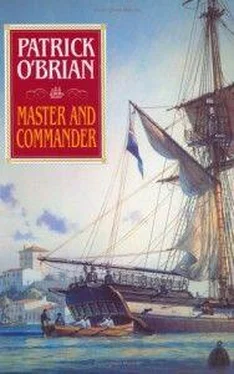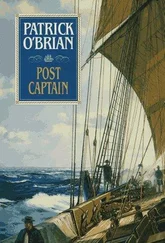Before the mast there was much less sadness, although there were several men – far more than usual – who looked forward with no pleasure to Thursday morning, when they were to be flogged. Most of the others had nothing positive to be glum about, apart from the hard work and the short commons; yet nevertheless the Sophie was already so very much of a community that every man aboard was conscious of something out of joint, something more than their officers' snappishness – what, they could not tell; but it took away from their ordinary genial flow. The gloom on the quarter-deck seeped forward, reaching as far as the goat-house, the manger, and even the hawse-holes themselves.
The Sophie, then, considered as an entity, was not at the top of her form as she worked through the night on the dying tramontana; nor yet in the morning, when the northerly weather was followed (as it so often happens in those waters) by wreathing mists from the south-west, very lovely for those who do not have to navigate a vessel through them, close in shore, and the forerunners of a blazing day. But this state was nothing in comparison with the tense alarm, not to say the dejection and even dread, that Stephen discovered when he stepped on to the quarter-deck just at sunrise.
He had been woken by the drum beating to quarters. He had gone directly to the cockpit, and there with Cheslin's help he had arranged his instruments. A bright eager face from the upper regions had announced 'a thundering great xebec round the cape, right in with the land'. He acknowledged this with mild approval, and after a while he fell to sharpening his catlin; then he sharpened his lancets and then his fleam-toothed saw with a little hone that he had bought for the purpose in Tortosa. Time passed, and the face was replaced by another, a very much altered pallid face that delivered the captain's compliments and desired him to come on deck. 'Good morning, Doctor,' said Jack, and Stephen noticed that his smile was strained, his eyes hard and wary. 'It looks as though we had caught a Tartar.' He nodded over the water towards a long, sharp, strikingly beautiful vessel, bright light red against the sullen cliffs behind. She lay low in the water for her size (four times the Sophie's bulk), but a high kind of flying platform carried out her stern, so that it jutted far over her counter, while a singular beak-like projection advanced her prow a good twenty feet beyond her stem. Her main and mizen masts bore immense curved double tapering lateen yards, whose sails were spilling the south-east air to allow the Sophie to come up with her; and even at this distance Stephen noticed that the yards, too, were red. Her starboard broadside, facing the Sophie, had no less than sixteen gunports in it; and her decks were extraordinarily crowded with men
'A thirty-two-gun xebec-frigate,' said Jack, 'and she cannot be anything but Spanish. Her hanging-ports deceived us entirely – thought she was a merchantman until the east moment – and nearly all her hands were down below. Mr Dillon, get a few more people out of sight without its showing. Mr Marshall, three or four men, no more, to shake out the reef in the fore topsail – they are to do it slowly, like lubbers. Anderssen, call out something in Danish again and let that bucket dangle over the side.' In a lower voice to Stephen, 'You see her, the fox? Those ports opened two minutes ago, quite hidden by all that bloody paintwork. And although she was thinking of swaying up her square yards – look at her foremast – she can have that lateen back in a moment, and snap us up directly. We must stand on – no choice – and see whether we can't amuse her. Mr Ricketts, you have the flags ready to hand? Slip off your jacket at once and toss it into the locker. Yes, there she goes.' A gun spoke from the frigate's quarter-deck: the ball skipped across the Sophie's bows, and the Spanish colours appeared, clear of the warning smoke. 'Carry on, Mr Ricketts,' said Jack. The Dannebrog broke out at the Sophie's gaff-end, followed by the yellow quarantine flag at the fore. 'Pram, come up here and wave your arms about. Give orders in Danish. Mr Marshall, heave to awkwardly in half a cable's length. No nearer.'
Closer and closer. Dead silence aboard the Sophie: gabble drifting across from the xebec. Standing just behind Pram, in his shirt sleeves and breeches – no uniform coat – Jack took the wheel. 'Look at all those people,' he said, half to himself and half to Stephen. 'There must be three hundred and more. They will hail us in a couple of minutes. Now, sir, Pram is going to tell them we are a Dane, a few days out of Algiers: I beg you will support him in Spanish, or any other language you see fit, as the opportunity offers.'
The hail came clear over the morning sea. 'What brig?'
'Good and loud, Pram,' said Jack.
'Clomer!' called the quartermaster in the buff waistcoat, and very faintly off the cliffs there came back the cry 'Clomer!' with the same hint of defiance, though so diminished.
'Back the foretopsail slowly, Mr Marshall,' murmured Jack, 'and keep the hands to the braces.' He murmured, for he knew very well that the frigate's officers had their glasses trained on the quarter-deck, and a persuasive fallacy assured him that the glasses would magnify his voice as well.
The way began to come off the brig, and at the same time the close groups aboard the xebec, her gun-crews, began to disperse. For a moment Jack thought it was all over and his heart, hitherto tranquil, began to bound and thump. But no. A boat was putting off.
'Perhaps we shall not be able to avoid this action,' he said. 'Mr Dillon, the guns are double-shotted, I believe?'
'Treble, sir,' said James, and looking at him Stephen saw that look of mad happiness he had known often enough, in former years – the contained look of a fox about to do something utterly insane.
The breeze and the current kept heaving the Sophie in towards the frigate, whose crew were going back to their task of changing from a lateen to a square rig: they swarmed thick into the shrouds, looking curiously at the docile brig, which was just about to be boarded by their launch.
'Hail the officer, Pram,' said Jack, and Pram went to the rail. He uttered a loud, seamanlike, emphatic statement in Danish; but very ludicrously in pidgin-Danish. And no recognizable form of Algiers appeared only the Danish for Barbary coast, vainly repeated.
The Spanish bowman was about to hook on when
Stephen, speaking a Scandinavian but instantly comprehensible Spanish, called out, 'Have you a surgeon that understands the plague aboard your ship?'
The bowman lowered his hook. The officer said, 'Why?'
'Some of our men were taken poorly at Algiers, and we are afraid We cannot tell what it is'
'Back water,' said the Spanish officer to his men. 'Where did you say you had touched?'
'Algiers, Alger, Argel: it was there the men went ashore. Pray what is the plague like? Swellings? Buboes? Will you come and look at them? Pray, sir, take this rope
'Back water,' said the officer again 'And they went ashore at Algiers?'
'Yes Will you send your surgeon?'
'No. Poor people, God and His Mother preserve you.'
'May we come for medicines? Pray let me come into your boat.'
'No,' said the officer, crossing himself. 'No, no. Keep off,
or we shall fire into you. Keep out to sea – the sea will cure them. God be with you, poor people. And a happy voyage to you.' He could be seen ordering the bowman to throw the boathook into the sea, and the launch pulled back fast to the bright-red xebec.
They were within very easy hailing distance now, and a voice from the frigate called out some words in Danish; Pram replied; and then a tall thin figure on the quarter-deck, obviously the captain, asked, had they seen an English sloop-of-war, a brig?
Читать дальше
Конец ознакомительного отрывка
Купить книгу












